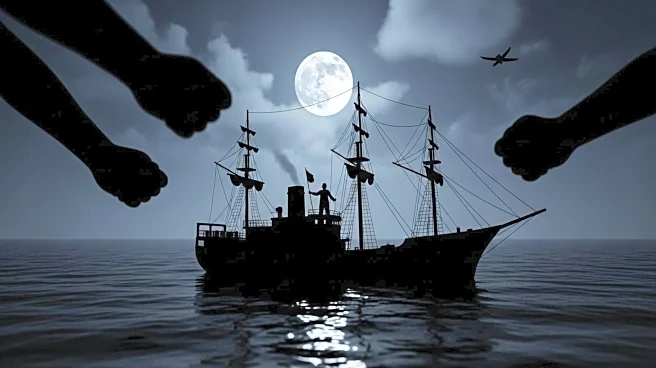What is the story about?
What's Happening?
The Israeli military intercepted a flotilla of nearly 50 boats carrying humanitarian aid towards Gaza, arresting activists including Swedish climate campaigner Greta Thunberg. The interception occurred approximately 75 miles off the coast, as the convoy attempted to breach Israel's maritime blockade. Israeli authorities boarded the vessels, including the Alma and Sirius, and transferred the passengers to an Israeli port. The Israeli Foreign Ministry stated that the activists are safe and healthy, reiterating its offer to transfer the aid to Gaza through other channels. Israel's Foreign Minister Gideon Sa'ar labeled the flotilla a provocation, urging them to stop and transfer aid through official channels. Israel claims the flotilla is linked to Hamas, though activists deny these accusations.
Why It's Important?
The interception of the flotilla highlights ongoing tensions surrounding the Israeli blockade of Gaza, which has been in place since Hamas took control of the territory in 2007. The blockade aims to prevent the transfer of weapons to Gaza, but has been criticized for restricting humanitarian aid. The involvement of high-profile activists like Greta Thunberg draws international attention to the humanitarian situation in Gaza and the legal complexities of maritime blockades. European governments, including Spain and Italy, have expressed concern over the interception, with Spain defending the humanitarian mission. The incident underscores the contentious nature of Israel's blockade and the broader geopolitical implications of aid delivery to Gaza.
What's Next?
The interception may lead to increased diplomatic tensions between Israel and European countries that supported the flotilla. Activists and international law experts may challenge the legality of Israel's actions, potentially leading to legal proceedings. The situation could also impact ongoing discussions about President Trump's proposal for ending the war in Gaza. European governments may continue to advocate for humanitarian access to Gaza, while Israel may face pressure to justify its blockade under international law. The incident could influence future humanitarian missions and the strategies employed by activists to deliver aid to Gaza.
Beyond the Headlines
The interception raises questions about the balance between security concerns and humanitarian needs in conflict zones. It highlights the ethical dilemmas faced by governments in enforcing blockades and the rights of civilians to receive aid. The involvement of international figures like Greta Thunberg may shift public perception and increase advocacy for humanitarian access. The legal debate over the blockade's justification and the rights of vessels in international waters could have long-term implications for maritime law and humanitarian missions.














